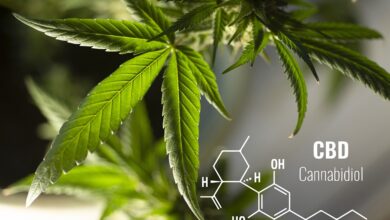The Science Behind Delta 9 THC: How Does It Affect the Body?

Delta 9 tetrahydrocannabinol, also known as THC, is the main psychoactive compound found in cannabis. It is responsible for the euphoric or “high” feeling that is commonly associated with consuming marijuana. In recent years, there has been a growing interest in understanding the science behind how THC affects the body, particularly as various forms of cannabis and cannabis-derived products become more readily available.
In this article, we will explore the science behind THC, how it affects the body, and the potential implications for our health and well-being.
Understanding Delta 9 THC
Before delving into how THC affects the body, it’s essential to have a basic understanding of how it works. THC interacts with the body’s endocannabinoid system, which is a complex network of receptors, molecules, and enzymes that play a crucial role in regulating various physiological processes, including mood, memory, pain sensation, and appetite.
When THC is consumed, either through smoking, vaping, or ingesting cannabis or cannabis-derived products, it binds to cannabinoid receptors in the brain and body. The main receptors THC interacts with are known as CB1 and CB2 receptors. CB1 receptors are primarily located in the brain and nervous system, while CB2 receptors are found in peripheral tissues, including the immune system.
The binding of THC to these receptors leads to a cascade of effects, including altered neurotransmitter release, changes in synaptic function, and modulation of signaling pathways that ultimately result in the characteristic effects associated with THC consumption.
How Does THC Affect the Body?
The effects of THC on the body can vary depending on several factors, including the method of consumption, the dosage, and the individual’s tolerance and sensitivity to the compound. Some of the most common effects of THC consumption include:
– Euphoria and relaxation
– Altered perception of time and space
– Increased appetite (otherwise known as “the munchies”)
– Impaired coordination and motor skills
– Altered sensory perception, including heightened sensitivity to sights, sounds, and tastes
– Short-term memory impairment
– Changes in mood and emotional regulation
– Potential for anxiety and paranoia, particularly at higher doses or in individuals with pre-existing mental health conditions
It’s important to note that while many people consume THC for its psychoactive effects, some individuals may experience adverse reactions, including increased anxiety, paranoia, and psychosis, particularly at higher doses or in those predisposed to mental health disorders.
THC and Health Implications
In recent years, there has been a growing interest in the potential therapeutic uses of THC, particularly for conditions such as chronic pain, inflammation, nausea, and appetite stimulation. Additionally, pharmaceutical preparations of THC, such as dronabinol and nabilone, have been approved for medical use in some countries for the treatment of nausea and vomiting associated with chemotherapy and for the stimulation of appetite in patients with AIDS-related wasting syndrome.
In addition to its potential therapeutic uses, there is also ongoing research into the potential health implications of long-term THC use, particularly in the context of cannabis use disorder, cognitive impairment, and the risk of developing mental health disorders such as schizophrenia.
Frequently Asked Questions
Q: Is THC addictive?
A: While THC itself is not considered physically addictive in the same way as substances like nicotine or opioids, some individuals may develop a psychological dependence on cannabis, particularly with regular and heavy use.
Q: What are the potential risks of long-term THC use?
A: Long-term use of THC has been associated with potential cognitive impairments, particularly in adolescents and young adults whose brains are still developing. Additionally, chronic use of high-potency cannabis has been linked to an increased risk of developing psychiatric disorders such as schizophrenia.
Q: Can THC be used for medical purposes?
A: Yes, there is growing evidence supporting the potential therapeutic uses of THC for conditions such as chronic pain, inflammation, nausea, and appetite stimulation. However, it’s important to use THC-based products under the guidance of a healthcare professional to minimize potential risks and maximize benefits.
In conclusion, the science behind delta 9 THC and its effects on the body is complex and multi-faceted. While THC has potential therapeutic uses, it also carries inherent risks, particularly with long-term and heavy use. As our understanding of the endocannabinoid system and THC continues to evolve, it’s essential to approach its consumption with caution and informed decision-making. If you’re considering using THC for medical or recreational purposes, it’s crucial to seek guidance from qualified healthcare professionals and to be mindful of the potential implications for your overall health and well-being.
[ad_2]



